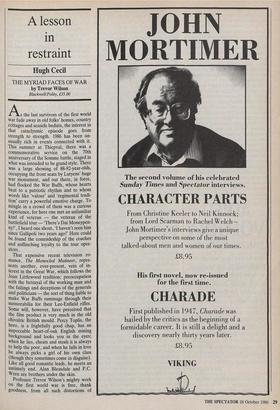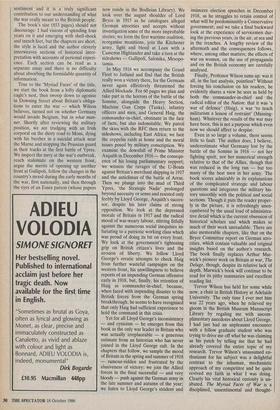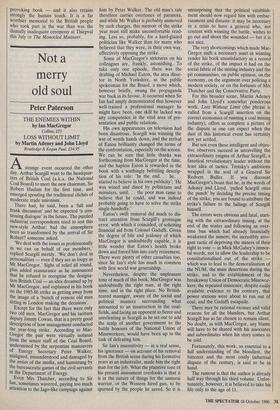A lesson in restraint
Hugh Cecil
THE MYRIAD FACES OF WAR by Trevor Wilson Blackwell/Polity, 85.00 As the last survivors of the first world war fade away in old folks' homes, country cottages and seaside bedsits, the interest in that cataclysmic episode goes from strength to strength. 1986 has been un- usually rich in events connected with it. This summer at Thiepval, there was a commemorative service on the 70th anniversary of the Somme battle, staged in what was intended to be grand style. There was a large showing of 88-92-year-olds, occupying the front seats by Lutyens' huge war monument, and out there, in force, had flocked the War Buffs, whose hearts beat to a patriotic rhythm and to whom words like 'valour' and 'regimental tradi- tion' carry a powerful emotive charge. To mingle in a crowd of them was a curious experience, for here one met an unfamiliar kind of veteran — the veteran of the battlefield tOur — 'There's Dai Moneypen- ny!' , I heard one shout, 'I haven't seen him since Gallipoli two years ago!' Here could be found the comradeship of the coaches and unflinching loyalty to the tour oper- ators.
That expensive recent television ro- mance, The Monocled Mutineer, repre- sents another, ever-present, vein of in- terest in the Great War, which follows the Joan Littlewood tradition: preoccupation With the betrayal of the working man and the failings and deceptions of the generals and politicians — the sort of thing liable to make War Buffs rummage through their memorabilia for their Lee-Enfield rifles. Some will, however, have perceived that the film product is very much in the old Chivalric British mould. Percy Toplis, the hero, is a frightfully good chap, has an impeccable heart-of-oak English mining background and looks you in the eyes; when he lies, cheats and steals it is always to help the poor, and when he falls in love he always picks a girl of his own class (though they sometimes come in disguise). Like all good romantic leads, he meets an untimely end. Alan Bleasdale and P.C. Wren are brothers under the skin.
Professor Trevor Wilson's mighty work on the first world war is free, thank goodness, from all such distortions of sentiment and it is a truly significant contribution to our understanding of what the war really meant to the British people.
The book's size (853 pages) should not discourage: I had visions of spending four years on it and emerging with shell-shock and trench feet, but the chapters are short, the style is lucid and the author cleverly interweaves sections of historical inter- pretation with accounts of personal experi- ence. Each section can be read as a separate essay and there is no difficulty about absorbing the formidable quantity of information.
True to the 'Myriad Faces' of the title, we start the book from a lofty diplomatic eagle's nest, then swoop down to agonise in Downing Street about Britain's obliga- tions to enter the war — which Wilson believes, turned not on whether Germany would invade Belgium, but in what man- ner. Shortly after reviewing the military position, we are trudging with an Irish corporal on the dusty road to Mons, dying with his brother in a suicidal attack near the Marne and stopping the Prussian guard in their tracks at the first battle of Ypres. We inspect the navy at the war's outbreak, reach stalemate on the western front, argue the merits of opening up another front at Gallipoli, follow the changes in the country's mood during the early months of the war, first nationally, and then through the eyes of an Essex parson (whose papers now reside in the Bodleian Library). We look over the august shoulder of Lord Bryce in 1915 as he catalogues alleged German atrocities and accepts without investigation some of the more improbable stories; we form the first wartime coalition, reorganise munitions, join the Kitchener army, fight and bleed at Loos with a Cameron Highlander and take a turn at the sideshows — Gallipoli, Salonika, Mesopo- tamia.
In May 1916 we accompany the Grand Fleet to Jutland and find that the British really won a victory there, for the Germans never again effectively threatened the Allied blockade. For 60 pages we plan and take part in the horrors of the battle of the Somme, alongside the Heavy Section, Machine Gun Corps (Tanks), infantry officers and men, and General Haig, the commander-in-chief, obstinate in the face of facts, but also indomitable. We patrol the skies with the RFC then return to the sideshows, including East Africa; we face the zeppelin raids at home and the moral issues posed by military conscription. We examine the downfall of Prime Minister Asquith in December 1916— the consequ- ence of his losing parliamentary support; we witness the ravages of the U-Boats against Britain's merchant shipping in 1917 and the anticlimax of the battle of Arras. Then we plunge into the mud of Third Ypres, 'the Strategic Nadir' prolonged beyond necessity or sense and resisted only feebly by Lloyd George, Asquith's succes- sor, despite his later claims of strong opposition. We look at the depressed morale of Britain in 1917 and the radical mood of war-weary labour, stirring fitfully against the numerous social inequities in- furiating to a patriotic working class which was proud of doing its bit on every front. We look at the government's tightening grip on British citizen's lives and the erosion of liberty. We follow Lloyd George's erratic attempts to check Haig from further wasteful campaigns on the western front, his unwillingness to believe reports of an impending German offensive early in 1918, but, finally, his retention of Haig as commander-in-chief, because, when faced with impending disaster to the British forces from the German spring breakthrough, he seems to have recognised that only Haig had sufficient experience to hold the command in this crisis.
Yet for all Lloyd George's inconsistency — and cynicism — he emerges from this book as the only war leader in Britain who was actually irreplaceable — a generous estimate from an historian who has never joined in the Lloyd George cult. In the chapters that follow, we sample the mood of Britain in the spring and summer of 1918 — rumour-ridden and frustrated by the elusiveness of victory; we join the Allied forces in the final successful — and very bloody — push against the German army in the late summer and autumn of the year; we listen to Lloyd George's strident and insincere election speeches in December 1918, as he struggles to retain control of what will be predominantly a Conservative government; and we take a final backward look at the experience of servicemen dur- ing the previous years, in the air, at sea and in the trenches. A lengthy review of the aftermath and the consequences follows, where, among other matters, the effects of war on women, on the use of propaganda and on the British economy are carefully analysed.
Finally, Professor Wilson sums up: was it all, in the last analysis, pointless? Without forcing his conclusion on his readers, he evidently shares a view he sees as held by both the commander-in-chief and the radical editor of the Nation: that it was 'a war of defence' (Haig), a war 'to teach militarism a lesson of restraint' (Massing- ham). Whatever the results of the war may have been, this is not a purpose which even now we should affect to despise.
Even in so large a volume, there seems little to fault. The author does, I believe, underestimate what Germany lost by the battle of the Somme in 1916 — not her fighting spirit, nor her numerical strength relative to that of the Allies, though that was reduced in the long run — but too many of the best men in her army. The book scores admirably in its explanations of the complicated strategic and labour questions and integrates the military his- tory smoothly with the political and social sections. Though it puts the reader proper- ly in the picture, it is refreshingly unen- cumbered by the usual load of administra- tive detail which is the current obsession of historical scholars and which makes so much of their work unreadable. There are also memorable chapters, like that on the Bryce Committee report on German atro- cities, which contain valuable and original insights based on the author's research. The book finally replaces Arthur Mar- wick's pioneer work on Britain at war, The Deluge, though, despite its relative lack of depth, Marwick's book will continue to be read for its pithy summaries and excellent reading list.
Trevor Wilson has held for some while now, a chair in British History at Adelaide University. The only time I ever met him was 22 years ago, when he relieved my gloom in the British Museum Manuscript Library by regaling me with uncom- plimentary anecdotes about Lloyd George. I had just had an unpleasant encounter with a fellow graduate student who was trying to drive me off what he was claiming as his patch by telling me that he had already covered the entire topic of my research. Trevor Wilson's unassumed en- thusiasm for his subject was a delightful contrast to the inhuman, mechanistic approach of my competitor and he quite revived my faith in what I was doing. Clearly his vital historical curiosity is un- abated. The Myriad Faces of War is a disciplined, unsentimental and thought- provoking book — and it also retains strongly the human touch. It is a far worthier memorial to the British people who took part in the war than was the dismally inadequate ceremony at Thiepval this July or The Monocled Mutineer.




















































 Previous page
Previous page